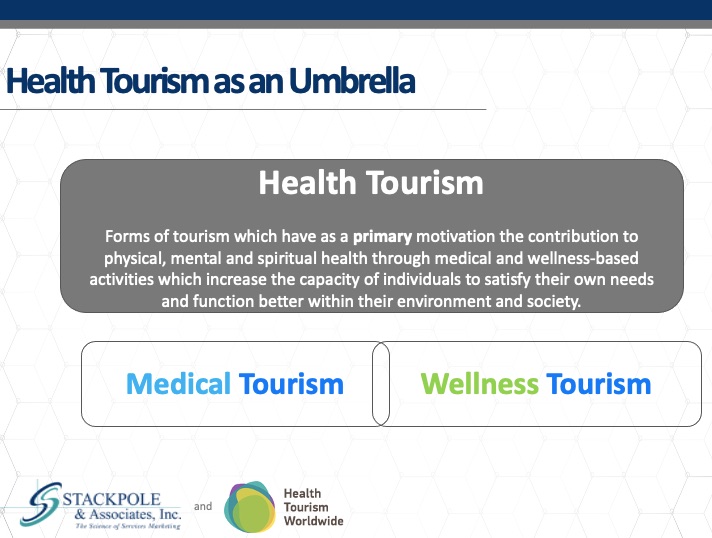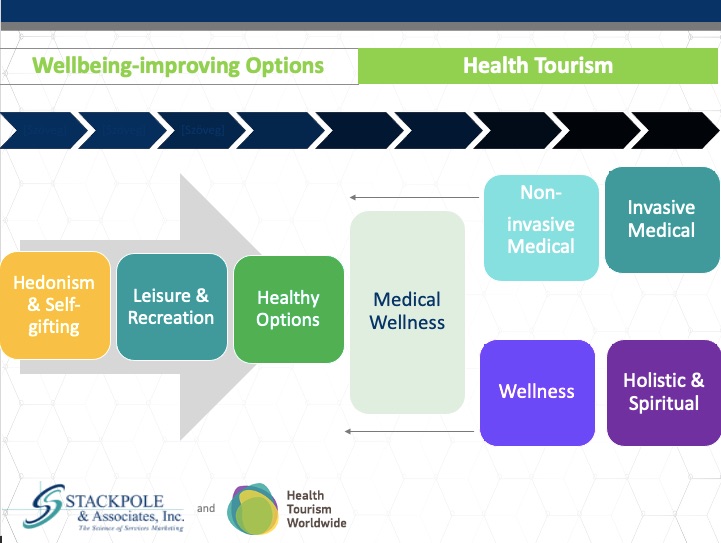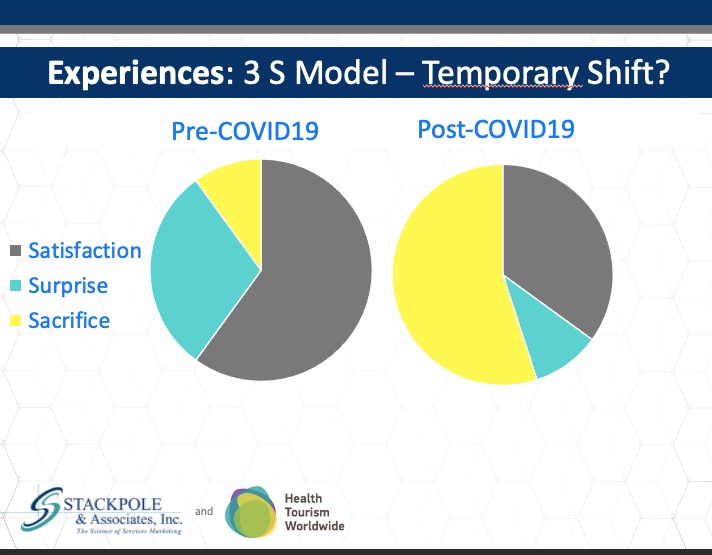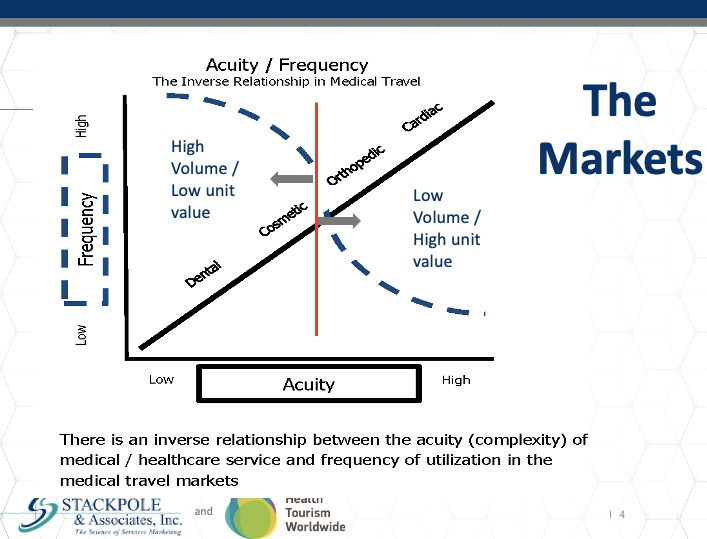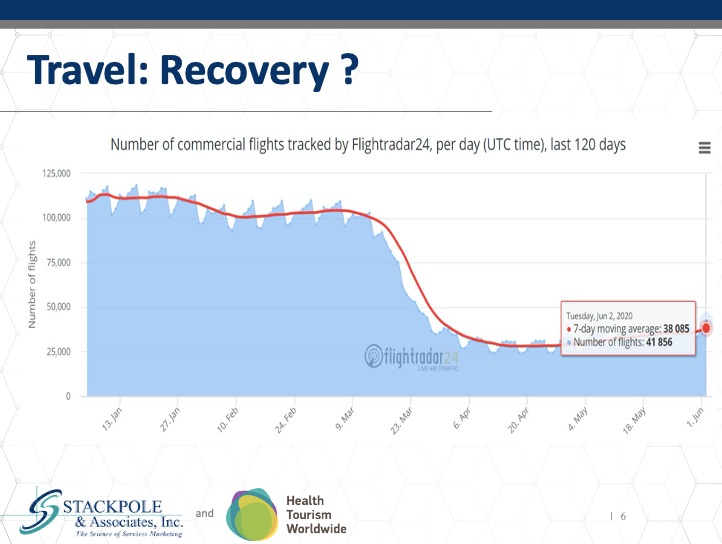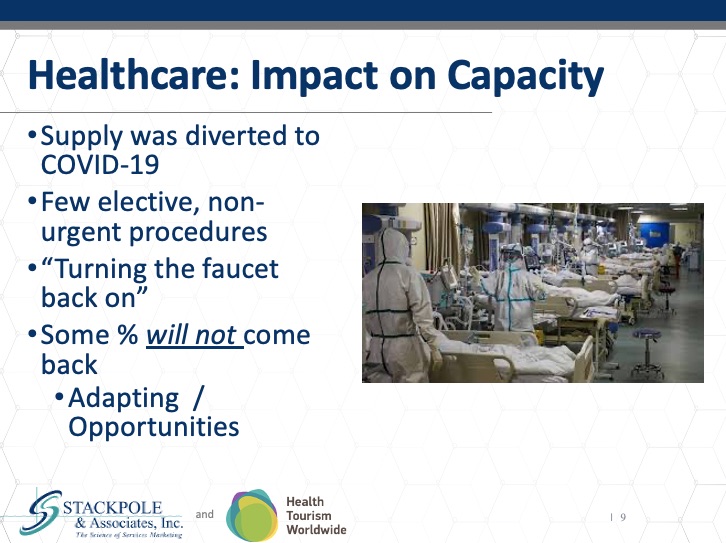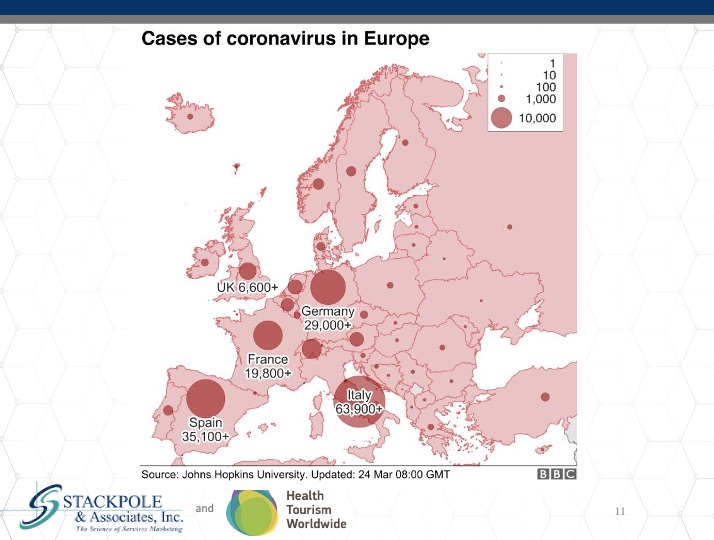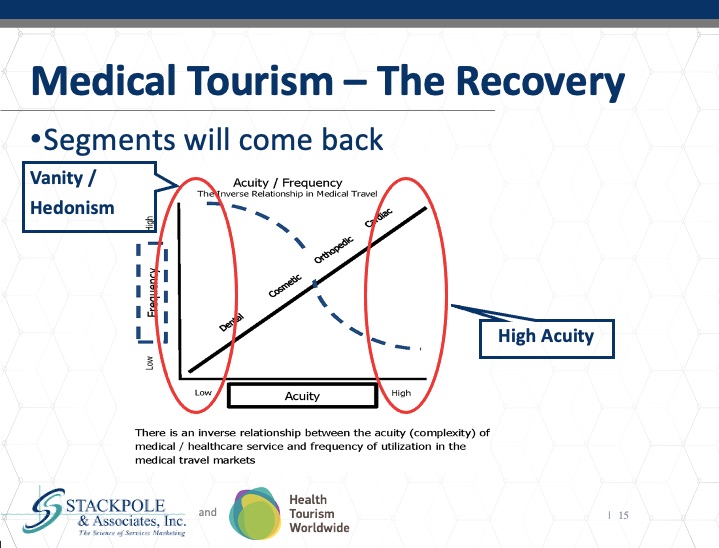To watch the recording click here
Register to download the webinar presentation.
Transcript
Health Tourism After COVID-19: The Road Ahead
Irving Stackpole & László Puczkó
László Puczkó
We appreciate your interest and your time. Health as such has become such a key issue in our lives and not just for traveling, but also for living, which may sound a little bit ludicrous, but that’s what it is because of the covid-19 and since medical tourism and health tourism has been talked about a lot recently, how they are developing such great market opportunities here. So, this is probably time to look into it, how we believe it really, it’s going to look like.
Certainly, since regulations change day by day, travel opportunities change day by day. Obviously, we can tell you what the best knowledge at this hearing, this moment we can share with you. Tourism is an umbrella term, and it includes medical tourism as well as wellness tourism. We understand that there are countries where you may have a different terminology, but to give common grounds, I thought it’s useful to have this mutual understanding of how we look into this business. I’m really covering the tourism side and Irving will be doing the medical tourism side. Then we would be happy to answer your questions.
The demand in medical tourism, we can now look at it from the perspective of is it a voluntary option, is it a prescribed option, is it or is a necessary option? After the actual situation, when we are opening up, we need to see how relaxation, escapism, spirituality, love, compulsion or self-image may change in our lives that are we going to look desperately for relaxation. We do want to escape from being locked down for months and weeks. Have we become more spiritual or we decide that you know what, I want to do something to complete my life as soon as humanly and physically possible, since I don’t know when I’m going to be locked down again, I will miss that opportunity?
So, I just want to do that activity or visiting that site, even for various purpose as soon as I can. Physically just can or I decide that after not being visiting the hairdresser for three months, this is the time to pay more attention to myself. I do something more about it, including a travel activity. So, don’t forget the prescribed activities after the after the opening could stay the same or even more accelerated because people will be kept from traveling for any kind of necessary or urgent medical condition.
At the same time, we might have that all these lovely opportunities like terrible facilities will be further down because our spouse, because we don’t quite know how to deal with them and manage them and disinfect them or hold in certain countries, they believe that hot water is actually very good because the lovely virus doesn’t actually like it too much in other countries.
So, we want to close them, keep them closed for months and months and months. Or you might say that I am interested in taking a retreat because I want to retune myself. Also, you might say that I kept from taking treatments for IVF and I really, really believe that this is the time to get this done. I want to have it done from the best place, because this is the last opportunity to prescribe activities will be covered, will be covered by Irving later.
How I believe that’s going to be influenced by the age groups and the various health care related regulatory activities by governments as well as insurance companies. Can you have a policy if you’re above a certain age? But don’t forget on the left hand side of this lovely chart, you can really see some key trigger points that a voluntary activity might be something that you really want to do very quickly, depending on where you are and what kind of segmentation you are using with you will need to be ready to change that or will be you will be able to look into segmentation in a very different way, because price may not be an issue anymore or not as much, but will be more important to certain people who lost their jobs.
You need to look at all the marketing segmentation recommendations of how many options we have for segmentation. Otherwise, you may want to go back to the old normal and the new normal will be probably so far away from it that you can actually provide the necessary answer, even if you have the best staff forever talking to staff therapists. I knew that a couple of colleagues are here on this call having a treatment provided by a therapist with gloves on. Maybe not your perfect idea for a spa treatment. We need to think of what is going to be realistic, what kind of a nature orientation or treatment duration will actually come up after the opening?
I think any destination planning, health related services would need to look at, but at least should consider this other process of thinking, because we might find people who are hedonistic and want to do self-gifting of actually gifting themselves with less experience-oriented trips, or people will look for way more healthy options. They need to be able to, as operator or a service designer or a therapist, will be able to will you will need to be able to describe how it is healthy, how many varieties of health we can have, how many layers of health we can have, and how your treatments and services would need to be enhanced and fine-tuned because of the more specific expectations of the healthy option.
Don’t forget, these people are not health travelers, not have three per say, but even a business traveler, even a cultural traveler, even traveler, may look for healthier options from gastronomy room provision treatments just on the side, even if cultural events, they might want to take part in well-being related cultural traditions and rituals. So, invite everyone to reconsider how you are labeling your services, how you are defining your services and trying to locate yourself on this great where you actually belong. Don’t misunderstand. This is no good or bad location for your service. It’s just you have to find the right one. Also, probably we will be looking into something which is a different way of thinking, lifespan and health span, even the World Health Organization started to talk about don’t mention how much of your life expectancy.
More like look into how many years of your life you can live healthily. I think this covid-19 really highlighted the importance of that. People will be looking for options and solutions and not just some easy marketing labels, but content and really, really content based service provision here. This is one of my favorite things. I know that service providers, developers, owners, even therapists can go nuts when we discuss these questions because they believe it’s just, looking at it in a very different way. And that’s what I personally like very much. You would really have to make a decision. What one thing you are choosing, you can choose to buy less washing. I believe that exactly the same services, just because you will call them wellness or unless improving yourself. But this is exactly what’s been happening. Like anything that green or you can go on the whole the whole road and you say all of my services will be classified or looked at my services and value propositions, how I can contribute to my guest’s wellness in a more complex way. But it’s still not de facto awareness as such.
But all of my services are really looked at from that perspective. You might say that you know what people want. It is fun and entertainment. And I combine wellness and entertainment and that’s what wealth attainment is. And sorry about the breaking the language, but I think it’s a good label here. And yes, we do have already opportunities that you can do yoga with goats. And then you might say that this is not proper yoga because that’s you can’t take it seriously. But to certain people, this is the way to enlighten and your even your soul and have some fun at the same time, doing some spiritual activity or physical activity. This you need a lot of creativity to come up with meaningful solutions.
You want to have guests who are interested in spirituality and spirituality in a certain way. And then you get yourself to meeting the demand of such guests, not something to everyone, but just certain things, but perfectly to a small group of people. I believe we will see a lot of those happening because people will be very savvy, and they will need to think twice when they travel to any destination. And then you can redefine, and you become an eminent of your service provision. You will find your guests. And yes, this is gin and tonic yoga. That’s this is about attainment. And you can say that this is totally stupid and unnecessary. But to be honest, I would love to have my day now, not necessarily, but maybe the yoga at the same time. But, you know, this this is what people, even men, can find it attractive.
Groups can find it attractive. And, yes, you can introduce yoga to people who wouldn’t have done yoga otherwise, even if those might say or many people might say that this is total rubbish and you just don’t know the finding of yoga. Still, this is one way to reach a different clientele group, different segment. And you still can do the yoga activities properly but bring in some fun. I really would like to see a lot of these fusion things coming up because that that makes trips different and your destination or your services can be really different from someone else’s. And yes, you can copy if someone else was doing it already, but you can come up with an equally exciting thing. And this is to some who don’t understand, this is an evidence-based awareness treatment because they love the volcanic heat, is heating up the lava from under you and you have an umbrella. You have to spend 15, 20, 30 minutes in that fine lava granules, but it’s good for your skin, get your detoxification, good for your mood. And you might call it bonus. You might call it entertainment. You might call it a show. Doesn’t matter how you call it, people can and will react to it because you can tell them the story that this is natural. This is giving you a certain kind of benefits and this is very local. You can’t. Somewhere else.
I really invite all of you taking part this webinar to do sit down and think about opportunities to come up with all these stories which would have evidence, locality history and content, which really redefines you and really refers to all the trigger points that guests of the future will have also. And go to summarizing the debate as part of this discussion and passing on to Irving in a minute. I believe most of you have heard a few acts, which is user experience, because everybody is talking about it. I would suggest that we need to move on. This is not just a technical service delivery option, not just service design. We need to change this to, well, experience design, not just service design, but understanding how any component of that service, of that journey or the guest journey can contribute to the well-being of the guests. It’s a fascinating task. When we do that with our partners and planes is absolutely fascinating to understand how many small items we can incorporate. And in the end of the day, the guests will say this was the best experience. They will not call it when it’s already being experienced. But we know that physically, mentally, psychological or socially, they really benefited from that experience.
But it’s a process that we need to a perfect and you would need to think about it. At least that’s the topic of another little webinar. Don’t forget that we understand that traveling as such, especially from now onwards, hoping that the airline travel will not be as horrific as the forecasts suggest, that traveling does contribute to your well-being in general. But we as. Professionals working in the business, we need to work on that, how that can be finer tuned, how that can be perfected, and this is why we are running this webinar as well to initiate the discussion, started to talk about it. How after a maybe a stressful flight, when you spend four hours checking in and then you be surrounded by, you know, on the crew, on the plane, bearing all the spacesuits and all the rest of it.
So by the time you arrive, you think this is really a horrific experience. You really experienced something for us which is really contributing to your well-being. And then you go home and on the way home, you have exactly the same sort of unpleasant about you have great memories. And often they say that perhaps tourism is a luxury. If you ask me, it’s more like unnecessary luxury, especially from time on the roads and we are opening up. I think that these are some really critical issues here in this topic.
Irving Stackpole
All of what Laszlo just reviewed is, of course, fundamentally about one side of the market, but also about both sides of the market. That is to say, both the health care and the higher acuity sides of the market. We review these markets, these segments in our in the book we wrote together, but also here in this program, it’s important that we all at least understand what our perspectives are and that in these markets, for both wellness, health, medical, dental services, there is an array of demand that ranges from very low acuity demand.
This is a general relationship between the demand and the acuity. The demand for low acuity services is high and the unit value is relatively low and the demand for complex surgeries, cancer treatments, heart valve replacements, these this demand is relatively small, yet it has a very high unit value. Going forward, historically and going forward, the factors that are important in the health tourism markets continue to be destination stability. Consumers want to go where they feel comfortable, where the political and economic regime is stable. Economics is important. They want to make sure consumers want to make sure and intermediaries that are referring consumers for complex care that can’t be provided in the residence location. They want to be sure that they are referring consumers to locations where their local currency, their sovereign currency, will go far. So the purchasing power parity is important. Equally important is capacity, if there’s no room in the inn or heart surgery or gallbladder surgery or knee replacement surgery, then why send the consumer there and in the post covid period? This issue of capacity is going to be extremely important.
We’ve seen a complete redirection of national health care systems away from elective procedures to availability for covid related treatments and procedures. What that has meant within the health care systems is extraordinarily important. We’ll talk about that further in a moment. Of course, reputation brand, the reputation of both the provider and the reputation of the destination are extremely important to consumers.
The destination’s brand is critical and central to how the consumer looks at and considers the brand other situations where the services are of a higher acuity, such as medical treatments, the provider destination, the provider brand, rather, can be very critical. For example, going to the Mayo Clinic in January. If you knew that Mayo Clinic was in the middle of Rochester, Minnesota, you may not want to go there in the middle of January, but because you seek treatment for a complex medical condition, the destination itself, Rochester, Minnesota, becomes less important than the destination of the brand.
The next issue is access, and this is going to be really important as the world emerges from this covid frozen or hibernation state of affairs, access from one point to another will become extraordinarily important to determine which health tourism routes open up before others. I was just listening today to a press conference by the European Union on the travel and tourism conventions that they’re attempting to forge within the Schengen area within the EU travel areas. These are evolving situations that we’ll need to keep a close watch on. And we’re trying to provide information on our website and other sources to customers and clients and colleagues alike.
Then finally, it’s price. Price is quite different from purchasing power parity. It comes at the end of the list because, as Laszlo’s suggested, we believe in the post covid period, the price will become either less important or significantly more important in consumer’s choice of where to go to consume services. It will become less important where pent up demand that demand eclipses concern about price, and that looks like, no, I don’t care what it costs, I’m just going to go. Or it just can’t wait any longer. I must go and I’ll do anything I need to do reasonably in order to afford that. Price, on the other hand, could become a real obstacle where millions of people are suddenly out of work and what we saw in the 2008 2009 Great Recession, which seems like a very modest in comparison to today’s situation, we saw a very significant reduction in health care demand as a result of unemployment.
We need to pay attention to which ends of the market we’re focused on and how these issues, how this set of issues will play out in those markets. One of the first things that’s important, of course, is travel in health tourism. And this is a chart that shows commercial and noncommercial airline activity for 2016 forward.
As you can see in March of 2020 all travel plummeted dramatically. We’ve seen that continue here in my adopted hometown of Lisbon, we used to hear jets flying by overhead all the time into and out of the airport. And that has slowed significantly to the point where when we hear an airline passenger plane flying overhead now, it’s a surprise. The re-engagement that we see is going to track with what we believe will be the likely re-engagement of the travel and tourism markets. And it won’t be a V very famously. There was an economist’s report done by the European Commission in 2006 that suggested a recovery from a pandemic would be a V shaped recovery and it won’t be a U shape.
With various scenarios as to when the constraint on travel is lifted and notice that these are absolutes. There’s one in July, this one in September, there’s one in December. It’s not likely to be any one of those, but a set of these. Still, we expect the recovery won’t be a smooth line, but rather a jagged set of on again, off again, put on the accelerator, foot on the brake kind of recovery. Now, this gets us back to the point I tried to make at the beginning about health care capacity, there are.
Significant numbers of deaths reported from covid-19 and virtually entire national health care systems have been rededicated to the care of persons with covid-19 and in certain locations such as Italy, where the acute hospitalized cases have started to decline or to subside. The nonurgent capacity is growing in the private system. In many countries where the public systems were devoted or dedicated to covering, the private systems have been achingly lacking in in in fulfillment. The supply is available and ready to be utilized. What we need is a lessening of the travel restrictions.
The available capacity is going to be critical. The available perceived safe capacity will be even more critical and that will get us into the brands of certain destinations and the way comparatively that consumers may look at certain destinations and certain providers in during the recovery period. Here is a heat map of deaths in Europe relative from the 5th of May. And this situation like that, since we were talking about earlier, I was reminded of champagne. In this map bubbles, smaller bubbles are better like champagne.
In certain locations where the bubbles are very small, the number of deaths is also very small. How will the publicity associated with deaths, with hospitalizations, how will the publicity that’s tied to a particular location, how will this affect the willingness of consumers in other locations to seek care or to seek services in those locations?
That remains to be seen and will be a very important component of the emergence of the health tourism markets. And one of the things we’re very much going to need, we’re going to need better segmentation. Laszlo referred to this earlier, not just demographic segmentation, but careful psychographic segmentation that looks at what the motivations are associated with consumers’ willingness or unwillingness to travel and how those factors play in with each other.
One of the things that’s very clear to me, this situation was the case prie covid and I believe it will endure post covid as well. Is that just as the market race from low acuity to high acuity and with low acuity being high volume, low unit value and high acuity being low volume, high value in the relationship between and among providers and destination’s the same sort of relationship? Occurs specifically, as I was referencing earlier, the destination of Rochester, Minnesota, is significantly less important than the destination Mayo Clinic. Similarly, the Cleveland Clinic, it’s a coincidence that it’s named after its location. But if people are looking for Cleveland Clinic level quaternary or tertiary services, the destination of Cleveland itself is less important to their concerns.
The recovery is an interesting and complex situation will continue to cover. It will continue to address it. The linear assumptions that more is better are likely to fall by the wayside. I believe many destinations will reevaluate this historical linear model. We can have more profitable medical tourism with fewer, more carefully selected tourists. As we’ve been attempting to say, segmenting will be the key to this recovery scenario here in this display showing the relationship between acuity and frequency, we see the segments for high acuity, basically selfish self-image and even hedonistic related services. We see the demand for that coming back very quickly, as well as the pent-up demand or exigent urgent high acuity services also coming back very early.
We can look for that and dial our communications and frankly, our consumer management, our lead management in this in this way, the. Engagement or re-engagement of the health tourism markets we see will be tentative, consumers will travel locally before they travel outside of their region. They’ll go across the region before they go across the country and certainly across the country, before they go across borders, borders. And it’s one of my colleagues reminded me of four countries like Germany. It’s going to be a very good summer.
There’ll be a tentative attitude by the consumer toward traveling and toward traveling outside of the region, even if regional restrictions are lifted. We’ll be dealing for some time with this concept of risk and risk abatement and providing consumers with. Confidence that where they are going is safe. Historically, safety has been what’s referred to as a must be quality of marketing services, and we never really used to refer to safety outright. We would show symbols of safety. So maybe what we’re looking for now is a series of symbols to show that a certain destination or a certain provider is safe and observing the strictest hygiene, disinfection and interpersonal behavioral procedures.
I know that certain accrediting agencies like Temos and others are working on certificates. I know that Portugal here where I live now is also working on a safe destination certificate. Some icons that can be applied to show consumers and give consumers that additional confidence. Fear and risk tolerance would be very interesting to follow in the in the in the days ahead.
Question: What should the health care providers, which focus on international patients do until the new normal arrives?
Laszlo Well, that very much depends on the destination. I think when you talk about countries or talk about cities, talk about areas, regions, that’s I think very, very region or product specific. I kind of somehow believe that we have a general rule here, especially that every destination will be impacted by an excess of what governments are going to do in terms of or airlines and airports and border authorities will do to check limit control supervised traveling of people. You can do all sorts of messages, whatever you wanted anyone. But the question is, it’s often not often it really doesn’t depend on you because you will be a victim of any kind of organizational structural regulation or activity. I think the most we will be able to say and I would like to just mention before that we are just about finishing up an industry depth interview series, looking at how and will look like in the next five, 10 years, said by June. We will have the results of that. Anybody interested that can be taken forward and we can talk about that later. The destinations would need to find their very own ways. We never, ever had any such thing in the history of tourism that literally anything and everything is closed. You don’t have benchmarks, you don’t have best practices, you don’t have something to copy.
You don’t have anything because everybody’s exactly the same place, which nothing is happening right now. I mean, most of the places. Everybody would like as soon as there would be some coordinated opening up destinations, would be desperately bombarding guests with various messages. I don’t know how many aerial videos you have seen or participants of empty cities of London, New York, Paris, whichever it is, every city wanted to show that we are empty and be waiting for you. But it’s not a very proposition that I’m waiting for you. That’s more like a wish. And this is, again, not just segmentation, but also what exactly you are when airlines can give you cheap tickets and you cannot count on a cheap flier, then you have to really find those people who really want to see you, not just one place which is relatively cheap, but a place which offers something which is relevant to me. So that’s why you need to define yourself, probably redefine yourself. And this is when it becomes complicated, because there’s too many players in the business and everybody will be desperate to have guests at any cost, the shortest time possible because of the cash flow problems and the financial situation. So that’s as I said earlier, that will be a very challenging position to be in, to talk to guests who are really our guests, not just some guests who may turn up at our place.
Irving I completely agree with you, Laszlo, and for providers in particular, it’s really up to you now to. Put your messages forward, share insights, clinical behavioral insights with your target audiences to see if you’re a health if you’re a wellness provider, show wellness tips for being in isolation. If you’re a hospital, provide authoritative clinical information about particular procedures. Laszlo was addressing destinations. But what providers can do is access the new telehealth telemetry tools to start to fill up your pipelines now to engage consumers who are suddenly completely oriented to using Zoom using Skype, using WhatsApp, the various video tools to reach out to the audiences whom you can’t host, but with whom you can have a conversation about when it’s safe, when you’re ready. What do I need? How do I get it? How will I access it and remain very open to how you manage those processes? So, the first bit of coaching and this goes back to the Crisis Communications webinar that we gave a few weeks ago, you can access this on our website. The first thing is you’ve got to say something.
The providers cannot afford to be silent during this time, either passively or actively. The second principle is using this time to fill up your pipelines with interested, motivated consumers who, when the time comes, will be willing to engage you as a provider of services.
Question: What psychographic characteristics should we look for from wellness, health and medical problems?
Irving, I think the model that the Stackpole & Associates has used historically is called the PRISM psychographic segmentation model, and that breaks down into risk aversion and risk acceptance. That’s one of the dimensions. And for the early ADAP, for the earliest, for the class of individuals who are earliest willing to assume the risks associated with traveling to consume services, you don’t want the people who are belts and braces. You want the people who really are quite adventurous, people who are willing to take a risk, people who are willing to go through the airports with masks on, get things stuck in their ears to take their temperatures and all this stuff. A gantlet of challenges that consumers will need to go through to travel will change. Those are the consumers for especially for medical services who we need to locate. And that can be done through good segmenting and segmenting tools on the wellness side.
Laszlo I would refer to lifestyle-based segmentation when age may not be relevant, when jobs will not be necessary, relevant where you live will not necessarily be relevant. But more relevant is how you look at life, what how you look at the world, which tribe you want to belong to. And I would like to refer to one of the terminologies that came up recently. When you combine and you combine seniors and teenagers and they become teenagers. So just because you technically belong to a senior age group, it doesn’t mean that you cannot find activities which typically teenagers find attractive right now, attractive yourself as well. And that cause, you know, the attention to how to look at a consumer data.
You may look at fashion data, you might look at leisure activities, data, you might look at all sorts of data sources, and then you amalgam something which is relevant to you. And this is a very different way of looking at data or consumer data and how people spend the money. And don’t forget the spending on a voluntary activity or elective activity, like you’re going to run through whatever kind it is or looking for services that may compete with not another trip or not pay the medical trip. But also, we actually are not spending any money on saving because I’m worried or they have barriers. What are those barriers that would keep people away from even thinking about traveling? And as soon as you understand those triggers which keep people or can initiate people, then you will be on a good track.
Question: With respect to covid-19, what techniques and or treatments might impact better health outcomes for some destinations or countries compared to others.
Laszlo We can become popular compared to others. I think anything that doesn’t have evidence, anything that doesn’t have not just a story, but something which is documented in a background information and the relevance people will be very suspicious about. We have a lot of mumbo jumbo. We have some amazing girly photographs and videographers’ services without any context or without any core message whatsoever. Just they look good, just like Instagram, without any kind of content. And I believe people will prefer destinations and services where they can find all these references, evidence, tests of clinical trials, if it’s medical, if it’s abundance, evidence, if it’s about illness, which can assure them this is not just a mockery. This is not just something for show, but there is some evidence behind it. And it’s being tested not just against covid-19, but against any kind of benefit, not just value, but also benefits.
Irving I couldn’t agree more, and I think that the evidence is clear that many more consumers are now spending far more time on the Internet, and one can only assume that some significant part of that time is evaluating various treatments, procedures, providers, destinations. And I expect that that behavior will carry forward in the new normal, whatever that looks like, that whatever research had been previously done by prospective health travelers to look at the destination and the provider, they’ll be even more of that going forward.
I believe we have an audience here with from lots of different countries where you have a lot of evidence that may be available only in your own language. Right. And that will be a major barrier because maybe domestically you can promote that service and people will find it relevant. But internationally, service providers, insurance companies will take evidence and facts in language and in a style that they can understand and find relevant. So revisiting of what you have and introducing it in the language and in a different style will be absolutely essential.
Question: Which demographics of small island states in, say, the Caribbean be focusing on their marketing efforts first to promote the health and wellness attributes? So I could go which demographic should pull in states in, say, the Caribbean be focusing on first in their marketing efforts to promote their health and wellness attributes?
Laszlo This is exactly the transport options, which are limited right now. And that will be essential here. And unfortunately, especially small islands probably that will be the last on the list of any major airline and even charter airlines to open up because of the financial issues and the frequency issues. However, especially Caribbean islands, as we know, Gulfstream and all those business jets just putting it on the market, larger private jets and especially those markets will open up, I think, very quickly. The very high end when you can cater for parties of 20 people, 15 people or 30 people who can fly in a small exclusive jet to your destination from a major source city through your private boarding channel, that will be probably something that can pick up very, very quickly.
Irving I agree with the concept that. The people with money will figure out a way to get there. There’s just this there’s no doubt about that and that the other side of the market that will. I believe, will be the high volume, low unit value side of the market, which lends itself to the wellness and health attributes of the Caribbean. Laszlo was absolutely correct that the first the constriction point in reentry re-engagement will be physical access. So how that physical access opens up the that the literal answer to the question is go for the demographic with the money. The employed forty-one- to sixty-four-year-old person with the disposable assets who can’t afford the private jet, it takes on a luxury. What we sure. Your combination of words, your conflation of words. Lifestyle is luxury necessity. It takes on a necessity for the necessary luxury.
Laszlo One mode of a segment and especially thinking about the Caribbean islands. I know the gig economy says gig is something that is being questioned or discussed heavily even before the covid, since it also includes employees who are temporarily employed only just for three months and they can be released very quickly. So that’s it provides them no security of a job, but also refers to not just the ones that I mentioned who are employed and they have a safe job, but also who are like bees flying from one project to another. And they may cash in a lot of money from one end. They have no time because the next project will come only in six months’ time. But they will have the intention, the money and the interest because they are the citizens of the world and they belong to the. But the 17 percent of the US economy is now employed in the economy and they might actually have the money and the intention, and they are not. So, trouble is, some of them are, but also they have families and they bring the kids as well. And that’s a totally different demographic. And it’s a totally different way of looking at travel because they don’t book six months ahead. They decide about next week and they may come for two months because they said, you know what, once you have Wi-Fi and I’m perfectly fine of doing my business from Curacao, whichever I’m selling in whichever country, and I certainly enjoy that and other people around, which is not good for the destination, but it’s fantastic for me.
Question With the NHS in the UK estimating to come out of this crisis with even bigger waiting lists for elective care in combination with the poor management of the crisis by the UK government, would you perhaps find more UK customers being more confident to travel abroad to a more safe destination to have their elective care?
Irving So I would answer that with by first modifying the question. I believe that. Certainly U.K. residents will certainly now feel more secure or feel more confident, he’ll be motivated to look at alternative destinations for their care and. There are two things at work here. One is the potential damage that certain. Locations, certain countries health care systems underwent the brand of not NHS inside of the U.K., but the brand of the NHS as a safe and secure place to go to consume services. That brand may be damaged going forward. The reputation may be damaged. Consumers inside the UK will now look up and look around. And I showed that map earlier of the European locations where the deaths were significantly higher and others where the death rates were significantly lower. The comparative competitive position of. Destination of destination countries, I believe, can become part of an advantage or disadvantage for providers located in those destinations or destinations that want to build and establish themselves as attractive medical travel destinations. So, yes, I believe that there will be a shift in the way UK consumers look at opportunities outside of their country. But I think it is not just the U.K. I believe that these motivations will be similarly altered and shifted across Europe and in other locations in the world as well.
Laszlo The public has private health care dilemma since the covid at the moment is really stretching the public health care service providers all across the world. And this is why in a certain country, not managing it as well as the consumers might have expected, regardless of it, is factual or it isn’t, since they are not health care professionals, they just only consumers. In that sense, they might opt for private service providers somewhere else. Either the which is an option, too, but also outside of the UK, because you say that, God, I don’t want to go through something like someone I know in NHS because it’s just horrific. All the images I’ve seen of the hospitals in Spain, public hospitals. But I will opt for private services. And you might say that even younger generations, that this is the moment when I need to decide of saving money for private health care. I need to take care of myself because I’m a little bit worried that public health care may not be up to such challenges and that may actually increase spending on on private health care. This is obviously is just an assumption at the moment. But in a couple of month’s time, we will probably see in a more secular way how this way this will go.
Question: Do you think that domestic medical tourism will come back first and then abroad? And then let it fly to its neighboring countries.
Irving Yes, very simply, yes, people will. It was a recent survey done in the US, in the U.K. that I, I looked at and it was quite robust. And the police consumers feel safest is in their cars. So it only makes sense that they’re going to use their cars to get to where they can receive the services, whether they’re on the hedonistic scale or the medically exigent side of the scale. They’re going to use their automobiles to get where they are. They can consume those services where they can acquire those services, which changes the look at the mapping and the procedures for looking at where you attract your consumers from changes quite a bit. And this is an important message for both providers and destinations at this time.
Laszlo When you are competing with domestic travelers, a domestic service provider, clinics, hospitals, physicians, you can provide an alternative and compelling proposition as long as you can say what your success rate are of a certain treatment or how low your infection rates are. Don’t forget, in countries and avenues that really very well even better than I do, that countries don’t necessarily share this critical information in the same fashion, especially public health care providers in one country as another country. And if you as a private health care provider, can show with actual and reliable data that your success rates, infection control rates and all those critical measures, KPIs, if you wish a really so great, then you can learn international patients as well that you really have to up your game and you have to be able to show facts of why your treatments, why your protocols are competitive.
Question: With destination countries except patients from abroad. And is this only in private providers as the public systems are going to be broke?
Irving Well, as far as I know, here are the number of. Consumers moving across international borders to consume care if it’s occurring anywhere, it’s a trickle. So I don’t know that this is occurring at all. I believe the markets have frozen, the travel have ceased. Travel is beginning to open up in Europe. And if the if the person asking the question was asking where we think it will open up first, it will open up first between those countries that have managed the pandemic most effectively. So it will open up fastest there. It will open up quickly where political will, despite the epidemiological facts, where political will says, I’m going to open up, I don’t think that’s going to inspire confidence among the consumers. But the markets will open up and we have to watch. We have to watch and see how travel resumes. There are available sources to go to for travel and tourism data that are updated regularly.
Irving We can watch how these markets begin to return. But we don’t expect a swift of V shape or even a U. Shaped return. It’s going to be far more gradual, halting and incremental.
Laszlo I think if we just add just one more line here, really, this is this is going to be the test of how well your personal brand or protocol brand is being built. If you can prove that I am the physician who weighed 15, 20, I don’t know how many years of experience I have been doing this treatment and protocol successfully, over three thousand patients. And I repeat the same. And it’s happening. And you have the results, and you are speaking in this country, that country, you have patents and all the rest of it. People will travel. That’s because they want you, they want your knowledge, your experience, and they want to have the best of the best in a moment like this, the same as in an advertisement. As long as you can prove this relevance and you can prove the background information and you really have to have personal brands. You have to have when we talk about destination development in, let’s say, health stories and we always look at it, to be clear, it is the enigma of the nine or 12 critical points of each of those points that you really excelled. Do you have that apart from price or availability? Because it will not be enough. People will not find it for the moment, especially short term, a good enough reason that you actually have some services.
Laszlo This is when you have to have technology, top notch technology, top notch surgeons, the best protocols of latest protocols that you have which are safe as well as providing results. I think the safe environment of competing in prices probably over for a while. I don’t know what you think about that, but that’s that you really have to up your game. And this is one destination development and branding really comes in something that’s we all need to work on.
Resources
- https://www.marketingforhealthtourism.com/
Stackpole & Associates is a marketing, research & strategy consulting firm focused on healthcare and seniors’ services markets. Irving can be reached directly at istackpole@stackpoleassociates.com.



